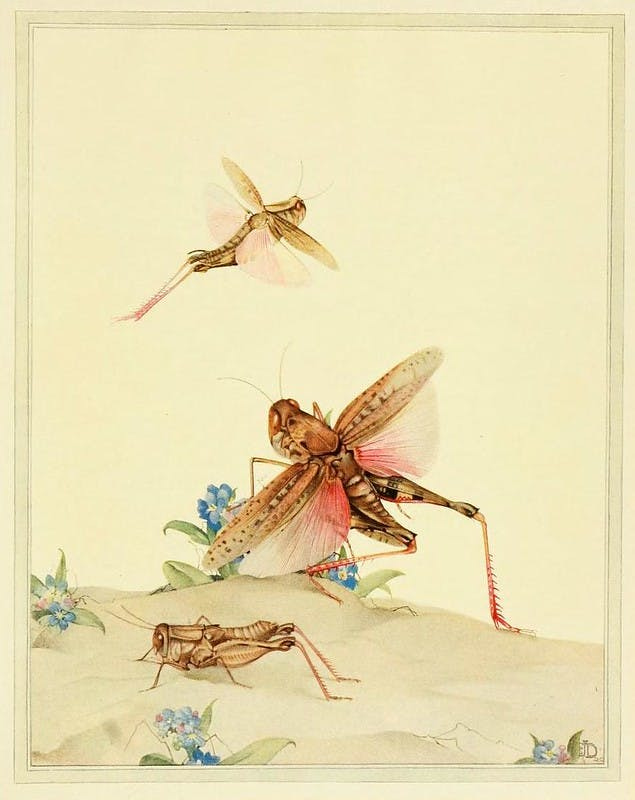
Dear Friends—
Today marks the official release day of my latest book, a collection of short lyric poetry called The Locust Years. (Portland-area people, before I forget: please come to an in-person celebration of the book with me and friends this Saturday, May 31st!) Writing is a strange mix of the solitary and the social. But this moment, when I get to share a larger and long-term project publicly, is where it all comes together. Read on for some thoughts as I release it, including how you can help (please do!) and a clue to the “riddle of the book” that I mention in the beginning note.
First, this past Sunday, one of the lessons in the traditional Anglican lectionary was that somewhat obscure one which inspired the title of the book, from the Book of Joel: “I will restore unto you the years that the locust hath eaten…”
I did not plan this. The lectionary rotates on a three year schedule, and so my back-of-napkin math tells me there’s roughly a 1 in 156 chance for this passage to have randomly come up the week that I release this book. By no means impossible, but how wonderful to hear it the same week that this book should release. I am not a believer in a God who chooses to micromanage the world. But, I do believe God absolutely delights in popping in once in a while, and I will take this seeming Coincidence as a direct and loving nod from Providence. I see you, kid…
I am preparing at the moment to help chaperone a middle-school field trip to Antelope, Oregon (I can smell that return bus already! Very glad I will be driving a baggage car). There will be something fitting about going out into Oregon’s great “rain shadow,” among the juniper and rattlesnakes and old Rajneesh cult compound buildings (now a camp), out of cell range, just as the book releases. (Should I find downtime between supervising Gaga Ball and working on Dish Crew, I will be sketching, in part, my next essay for this site, which I am very excited to share, and have tentatively titled “The Age of Novel Crimes.”)
The Locust Years is a wonderful book. I have told you about it already. Holding the hardcover was a special experience, and the art from Michael Cook only becomes more potent and magical each time I see it.
Three early readers contributed praise. These were acclaimed poet-priest-rock & roller Malcolm Guite, renowned contemporary artist and author Makoto Fujimura, and friend/lawyer/author/secret poet Justin Whitmel Earley. Selections from each of them:
Malcolm Guite:
These poems are reminiscent of the best of William Blake … there is not a trace of mere sentiment here, for these poems are alive to the pain and sorrow of ‘the years the locust devoured’ and yet they offer hope… This is a book to treasure and return to often.
Makoto Fujimura:
Paul J. Pastor’s poems are resplendent psalters … and we pause to behold them in wonder and delight. Paul’s words brim with contentment of abundance yet are full of tears, leaving this reader with the scent of a new season.
Justin Whitmel Earley:
…This collection startles the heart, walks it through a journey of grief and joy, and teaches us to feel again.
I am so humbled and honored by these words, and by the many, many messages I have recieved from all of you who are reading this book. I do believe it is what one reader shared, my “masterwork, so far.”
Now this little book is out and off for a life of its own, to do its work, to go places that I will never go, and be part of little stories that I will never hear. I will be thinking out in the desert about all this. (For more on the story of the book, read here.)
In the beginning of the book, I share a note for the reader, which reads in part:
…Real hope is painful. To hope is to risk disappointment. If the hope is large enough, it even means to risk despair. And so, we find ways to avoid hope. For some, it is anger. For some, it is apathy. For some, it is laughter. After all, to laugh at a man who calls death sleep is the most rational thing in the world. Right?
During this period of writing, I often thought of another passage of scripture (which you will see when you come across the title poem later in this book). The promise in that passage is another absurdity, worthy of laughter. The idea is that somehow an eaten thing might come back, that it might be restored. Those words were written after years of an ancient famine, prompted by the devastation of vast clouds of locusts. Those years of the famine—with their work, their rhythm, their hope, their life—simply were gone. Like green shoots of barley, whose freshness and tender youth will never come again; gone. And yet, there was a promise. I will restore to you the years that the locust hath eaten . . .
In his story “The Garden of Forking Paths,” Jorge Luis Borges places an excellent question in the mouth of a character: “In a riddle whose answer is chess, what is the only prohibited word?” The answer, of course, is simple. Chess is the only word that may not be used. While it may seem that the riddle of this book is about grief or loss or lack, or any number of things, it may be worth asking: what is the word that may not be said in the riddle of this book? (There is a word, a very common word, and it does not appear even once in these pages. That missing word is what this book is about.)
Enough then. Go read. I pray you glean something from the eaten field.
Oh, and by the way, I will, later in the year, share here at The Rose Fire what that word is—many of you are guessing it still, I know. (As a special hint only for you, my dear readers of The Stack, the word has five letters.)
NOW—what can you do, you ask? Well, here are some ideas! Many of you reading this were so kind as to preorder the book, and most (if not all) of those books have shipped. The past week I’ve been overwhelmed by (not an exaggeration) dozens of messages from readers near and far who have recieved a book and begun to read it. I believe that this is the most “whole” thing I’ve ever made, and I am so proud and happy to share it with you all.
Above, from my friend Stephen Proctor is one especially fine image from just upriver here in the Gorge. That deer! (Look to the end of this post for a selection of photos sent in by readers of the book in their environment…). Additionally, the respected Image journal has shared the book already as a Staff Recommendation—a true honor:
A book is made to be read, of course. I am under no illusions about hitting the bestseller lists, but I want this book to go to as many people as possible. I hope that you will get a copy if you have not already, and if you agree that others should read it, that you would share.
There are a few ways that you can help. One (you all can do this, and I would be so grateful!) is to simply leave an online rating and review at Goodreads or Amazon. This really does help new readers find it in the future.
Another thing (perhaps obvious) is to buy the book if you haven’t already. I’ve had a couple people ask where is best for them to purchase the book, especially for bulk orders for gifts or for book clubs, etc.. The answer is that anywhere is ok! With that said, I always encourage people to support their local independent bookseller. If you do not have a local “indie” of your own, then consider using mine, the legendary Arches Bookhouse in North Portland (last I checked, they were selling the first edition hardcover for 5.00 off!), or buying directly from my publisher, the excellent Wiseblood Books. This is best, and all as it should be. (If you order from A*****, I won’t judge you though, and I suppose it will mildly please the ravening algorithms.)
All other ways to support the book all fall under the umbrella of just share it with other people, please. If it means something to you, then just share it. Perhaps that’s memorizing a poem (many of these lend themselves to this!), and reciting it. Perhaps that’s ordering it for your local library, or leading a little discussion group about the themes of it for a book club, or perhaps it’s talking about it on your podcast, or pitching a review to your favorite magazine or mailing a copy to your aunt in Poughkeepsie or your uncle in Albuquerque. Just share it, if it means something to you!
Thank you, all, for your kindness in getting the word out, and in spending time with my writing in this way. We are celebrating!
Here are a few (publically-shared already) images from readers of The Locust Years in their homes and hands.
Go out and live, you little book!





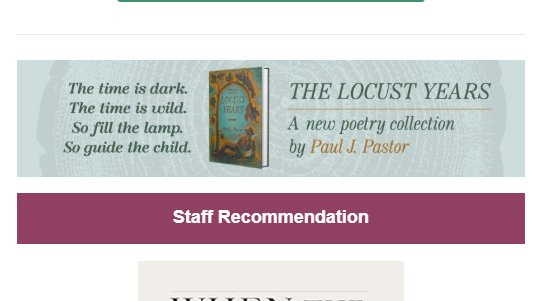

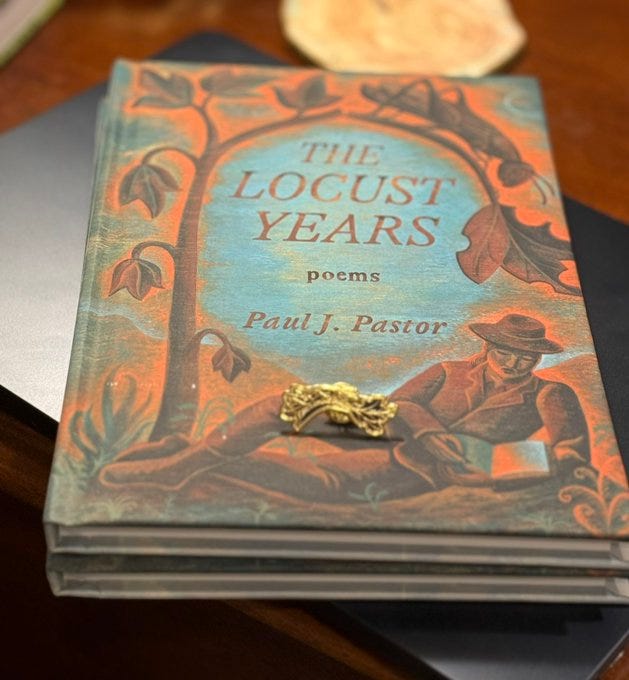
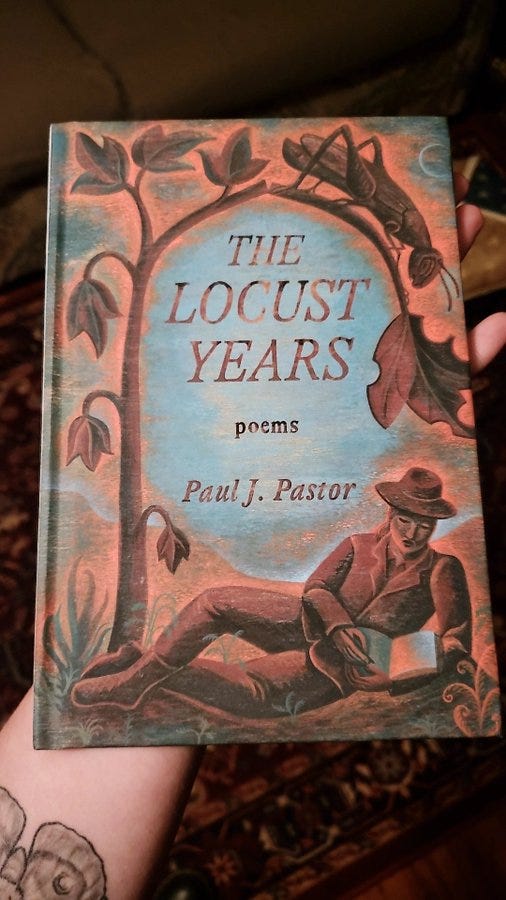



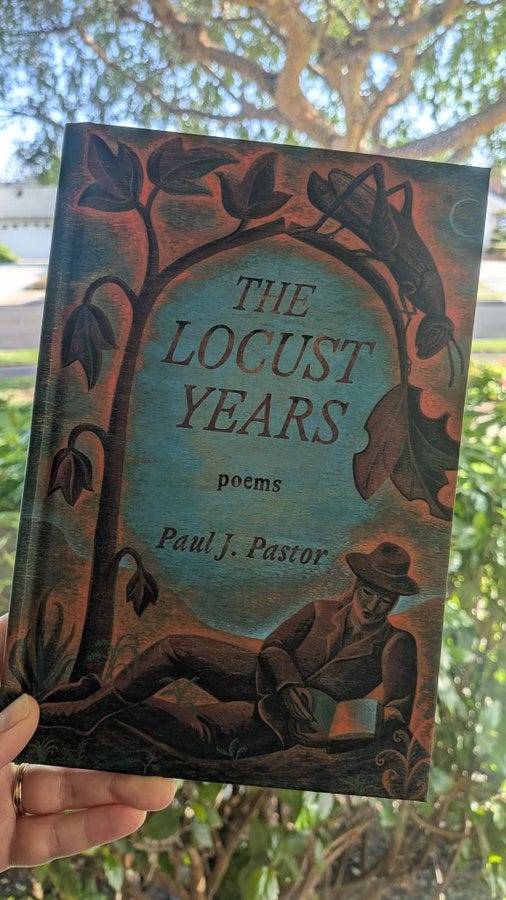
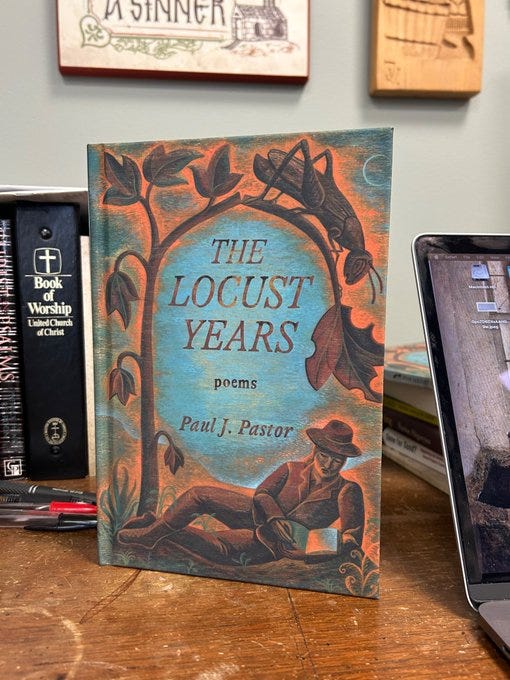
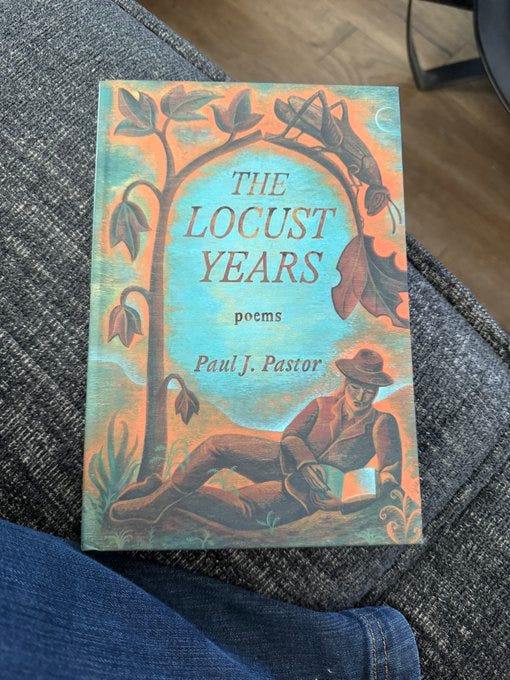
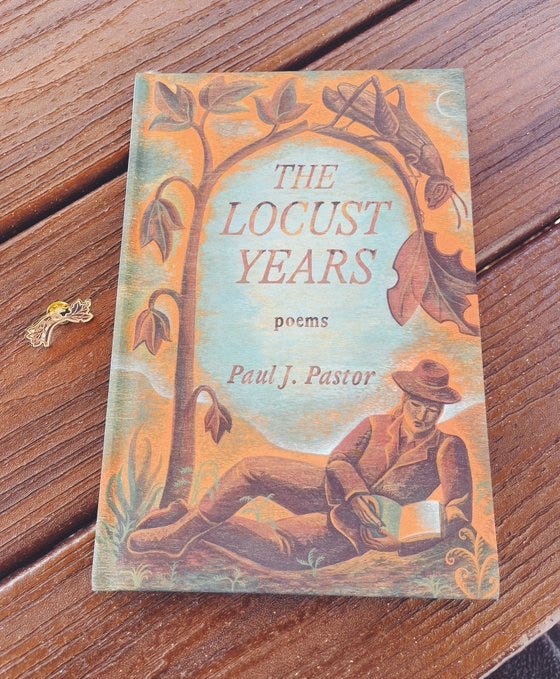
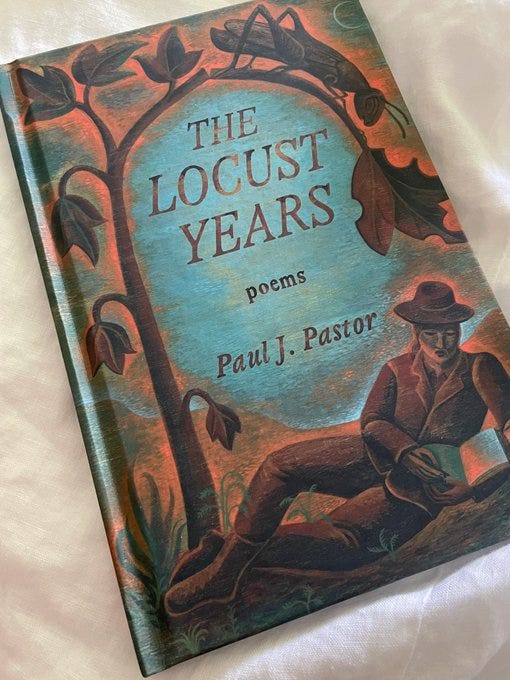
Paul! I’m grinning at your inclusion of a riddle. And just delighted that this is out! Congratulations, friend!
Savoring this beautiful offering! Excited to have you on the podcast in July! Will certainly rate and share! Blessings!